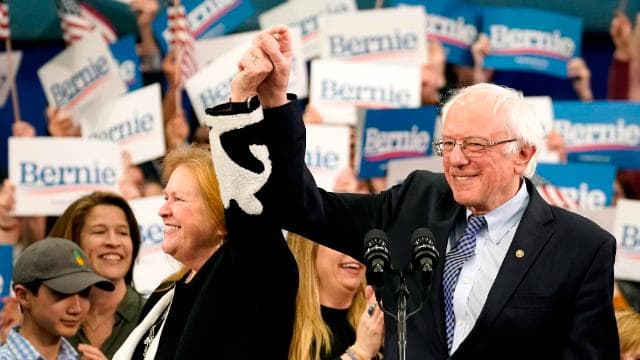
While the political world has already moved on from New Hampshire -- here we come, Nevada! -- there's a ton of data from the first-in-the-nation primary which can give us some insight into what Democratic voters want and who they think best represents their interests.
I went through the exit polling out of New Hampshire (you can check it out yourself right here) and plucked out some of the key numbers that tell us something about where the 2020 race is and where it's headed.
1) Sanders continues his dominance with young voters: Vermont Sen. Bernie Sanders won 51%(!) of the vote among voters 18-29. That's an absolutely stunning number when you consider there were 10 other serious and credible candidates on the ballot in New Hampshire on Tuesday. Sanders also won the next youngest age cohort (30-44), but with a less overwhelming 36%. Former South Bend, Indiana, Mayor Pete Buttigieg was the choice of those aged 45-64, while Minnesota Sen. Amy Klobuchar was the favorite among the 65+ crowd. The biggest voting bloc by age? Those between 45 and 64, who comprised almost 4 in 10 New Hampshire primary voters.
2) A less liberal electorate: Roughly 6 in 10 voters on Tuesday said they were either "very" (21%) or "somewhat" (40%) liberal. That's down from the 2016 New Hampshire Democratic primary, when almost 7 in 10 described themselves as "very" (26%) or "somewhat" (42%) liberal. Those identifying as "moderate" also jumped from 27% in 2016 to 36% on Tuesday. That more moderate electorate likely explains why we had two centrists in Buttigieg and Klobuchar in second and third with a combined total of more than 44% of the overall vote.
3) Health care remains dominant issue: Asked to choose between four issues, almost 4 in 10 voters on Tuesday said health care was the most important one facing the country. That's an echo of the Iowa caucus electorate, and speaks to the centrality of the health care fight both in the Democratic primary and in the general election against Trump. Health care policy is a fundamental difference between the two Democratic front-runners -- with Sanders pushing a "Medicare for All" plan that would totally eliminate the private health insurance industry and Buttigieg backing a less ambitious plan that would work to improve on the Affordable Care Act.
4) Electability, electability, electability: More than 6 in 10 New Hampshire primary voters said they prioritize a candidate who can beat Trump while just 1 in 3 would prefer someone who agrees with them on most issues. Not surprisingly, Sanders was the clear favorite of those who cared more about issue agreement while Buttigieg was a slightly more narrow favorite among the electability crowd. What's become clear through the first two states is that Democratic voters care more about beating Trump than any specific policy position. What's far less clear is which candidate they believe is the most electable against the incumbent.
5) Sanders' ideas are mainstream Democratic ideas now: While the electorate on Tuesday identified as less liberal than four years ago, it was also clear in the data that some of the policies touted by Sanders that were once dismissed a radical are now favored by a majority of the party. Fully 60% said they backed a government-run health care system in place of a private marketplace (that's essentially "Medicare for All") while almost 7 in 10 (68%) expressed support for free tuition at public colleges and universities. It's a measure of how far Sanders has moved the party to the left over these past four years that policies that brought a snicker to many establishment Democrats in 2016 are now the mainstream views of the rank-and-file.
6) Democrats are mad as hell: Asked what their prevailing emotion is toward the Trump administration, almost 8 in 10 voters said "angry." Second place? "Dissatisfied" at just 15%. Sanders won "angry" voters with 29%, followed by Buttigieg and Klobuchar at 23% and 22%, respectively. In 2016, just 12% of New Hampshire voters described themselves as "angry" at the federal government. (The 2016 exit poll didn't ask about whether people were angry about outgoing President Barack Obama.)
7) Age is just a number: Good news for 78-year-old Sanders and 38-year-old Buttigieg: More than 3 in 4 voters said that a candidate's age was either a minor factor (30%) or "not a factor at all" (48%) in deciding their vote. If elected, Sanders would be the oldest president ever elected to a first term. Buttigieg, if elected, would be the youngest president ever.
8) A late-deciding crowd: Half -- HALF -- of voters on Tuesday said they made their minds up on a candidate in the last few days. That's stunning number -- especially when you consider just 25% said they made their minds up at that last minute four years ago. Among that large group of late deciders, Buttigieg (29%) was the favorite pick, followed by Klobuchar (24%).
9) Debates matter: Half -- HALF -- of voters said that last Friday's debate were either an important factor or the most important factor in deciding who to vote for on Tuesday. Klobuchar, who shined in that debate, won among both sets of voters. Mark your calendars for February 19 in Las Vegas and February 25 in Charleston. Both of those debates could well be critical moments in determining who over- and under-performs in the votes that follow hard on them.